Part IV Strengthening Partnerships with Diverse Actors and Disseminating Information on Development Cooperation
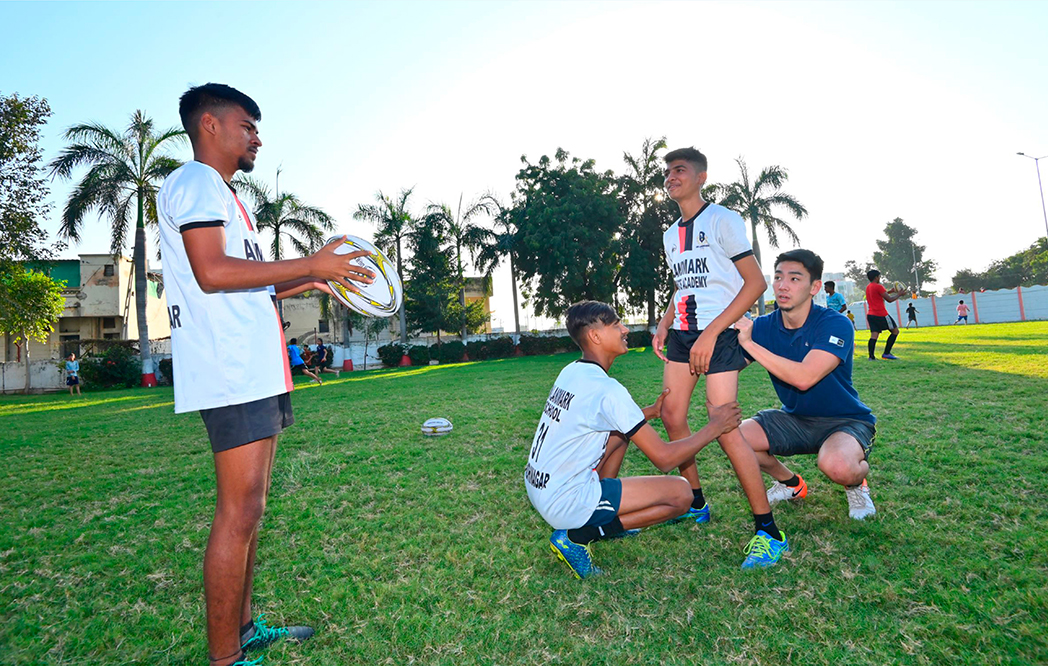
A JOCV coaching rugby to students at the school he is assigned to in Gandhinagar, Gujarat State in India (Photo: JICA)
1 Efforts for Strengthening Partnerships with Diverse Actors
(1) Partnership with Private Companies
The Government of Japan strives to effectively utilize the excellent technologies, knowledge, experience, and funds of Japanese private companies so that the overall capability of Japanese companies can be further demonstrated in ODA projects by the Ministry of Foreign Affairs (MOFA) and JICA. The Government of Japan promotes partnerships with the private sector in investment projects by incorporating the private sector’s knowledge and expertise into ODA projects as early as the project formulation stage, and by sharing the roles between the public and private sectors with ODA covering basic infrastructure and the private sector providing investment, operation, and maintenance. The aim is to carry out projects more efficiently and effectively, and to further enhance development outcomes.
A. Grant Aid for Business and Management Rights
In FY2014, the Government of Japan launched grant aid for business and management rights over public works projects in developing countries in which the private sector is involved in the overall implementation, from construction to operation and maintenance. This grant aid aims to leverage Japanese advanced technologies and know-how for the development of developing countries through facilitating Japanese companies’ acquisition of business and management rights. In FY2022, Japan and Cambodia signed the Exchange of Notes (E/N) regarding a grant aid for the “Project for the Expansion of Phum Prek Water Supply System.”
B. Improvement of Japan’s Yen Loans Leveraging Japan’s Strengths
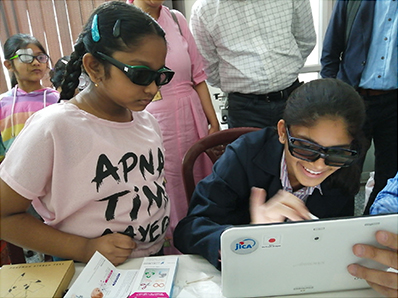
Indian children with weak sight using vision recovery training equipment (SDGs Business Supporting Survey)
In order to promote “Visible Japanese Development Cooperation” through utilizing and transferring Japan’s advanced technologies and know-how to developing countries, the Government of Japan introduces the Special Terms for Economic Partnership (STEP) under the yen loan scheme, which is further improved by expanding the scope of application and lowering the interest rates, among other measures. In addition, it introduces the Equity Back Finance (EBF) loan Note 1 and the Viability Gap Funding (VGF) loan Note 2 based on the improvement and application of measures by the recipient governments to promote the steady formulation and implementation of infrastructure development projects utilizing Public-Private Partnerships (PPPs) in which Japanese companies participate. In recent years, there are an increasing number of orders of yen loan projects by Japanese companies, which support their overseas business expansion.
In addition, as follow-up measures for “Partnerships for Quality Infrastructure,” Note 3 the Government of Japan makes efforts to improve its ODA loan and Private Sector Investment Finance (PSIF) by speeding up Japan’s yen loan procedures and creating new loan options. For example, the period necessary for government-related procedures for yen loans, which normally takes three years, has been reduced to approximately one and a half years at the fastest for important projects. The eligible countries for yen loans with repayment currency conversion options have been expanded to middle- to upper-middle-income countries and Dollar-Denominated Japanese ODA loans and Japan’s yen loans with Preferential Terms for High Specification Note 4 have been established, on the condition that JICA’s financial grounds are ensured. Based on its announcement on further speeding up yen loan procedures under the “Expanded Partnership for Quality Infrastructure,” Note 5 the Government of Japan has shortened the period required from the initiation of the feasibility study to commencement of construction work to one and a half years at the fastest and increased “the visibility” of the period required for projects implementation. Japan strives to improve its yen loan so that projects can be formulated and developed in an expeditious manner.
C. Proposal-based Public-Private Partnership Support Schemes
In order to actively utilize opinions and proposals from private companies, the Government of Japan and JICA also promote public-private partnership support schemes based on private sector proposals, such as “SDGs Business Supporting Surveys” and “Preparatory Surveys for Private-Sector Investment Finance.”
■ SDGs Business Supporting Surveys
SDGs Business Supporting Surveys Glossary is a program that aims to solve problems on the ground through business and to promote collaboration with a wide range of partners by incorporating ideas from private companies based on their creativity and originality. Public announcements are made on the JICA website, and JICA adopts proposals submitted by companies based on their content.
At the second public announcement in FY2021, a total of 24 projects in 13 countries (SME Partnership Promotion Survey: 7 projects; SDGs Business Model Formulation Survey with the Private Sector: 12 projects for the “SME Support Type” and 2 projects for the “SDGs Business Support Type”; SDGs Business Verification Survey with the Private Sector: 1 project for the “SME Support Type” and 2 projects for the “SDGs Business Support Type”) were adopted under this program. For the public announcements in FY2022, the program was reorganized on a trial basis to make it more convenient and effective. Through this reorganization, the new categories of “Needs Confirmation Survey” and “SDGs Business Validation Survey” were established in addition to the existing “SDGs Business Verification Survey with the Private Sector” (see also “Project Introduction Column,” and “Master Techniques from Japan to the World 4.” For more information about the program’s framework, target areas and countries, and other details, see the JICA website). Note 6
Zambia
Poverty Reduction by Converting Waste into Products
(1) Project for Expansion of Banana Paper Making Factory in Mfuwe in the Eastern Province
(1) Grant Assistance for Grass-Roots Human Security Project (December 2015 – April 2018)
(2) Small and Medium-Size Enterprise (SME) Partnership Promotion Survey for Sustainable Pulp Production Made of Banana Stems
(2) JICA’s SDGs Business Supporting Survey (November 2021 – January 2023)
Aiming to reduce poverty in Zambia’s rural areas, One Planet Café Ltd. started a banana paper business in 2011, focusing on discarded banana stems. One Planet Café purchases discarded banana stems from local farms and extracts fibers from the stems. The fibers become a raw material for paper. Adding value to “waste” results in an income increase for banana farmers.
Japan supports the company’s efforts through ODA. In the Grant Assistance for Grass-Roots Human Security Project, Japan supported expanding a factory and setting up a training room for making hand-made banana paper in Zambia. Meanwhile, the SDGs Business Supporting Survey provides assistance for research into processing banana stem fibers into pulp. This pulp will become a raw material for paper.
The banana fiber produced in Zambia is sent to Japan and made into banana paper at the Echizen Washi factory, which has a long history of making traditional Japanese paper called “washi” for over 1,500 years. Through collaboration with Japanese printing firms and paper product manufacturers, the use of banana paper is expanding around the world. The manufactured “One Planet Paper®” is the first paper in Japan to receive fair trade certification, and is widely used for such things as business cards, wrapping paper for cosmetic brands, and graduation certificates.
One Planet Café also conducts training to improve the income of people in rural Zambia, as well as wildlife conservation training. Poverty alleviation is expected to curb illegal deforestation, poaching, and the illegal trade of wild animals.
In this way, the public and private sectors collaborate to reduce poverty through creating new jobs and increasing income in Zambia.
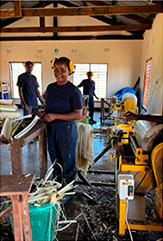
Local staff of the company operating a machine that extracts fibers from banana stems (Photo: JICA)

Postcards made with banana paper being sold at a local store (Photo: JICA)
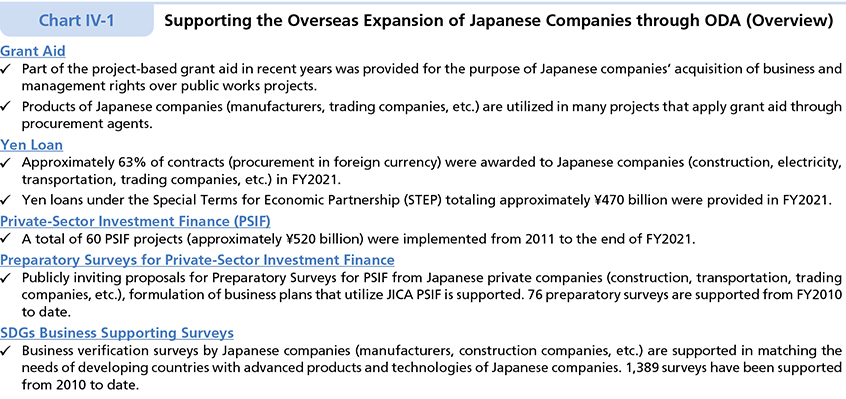
■ Preparatory Surveys for Private-Sector Investment Finance
In recent years, there has been a growing trend to improve infrastructure in developing countries through public-private partnerships and to promote economic and social development through private-sector projects. JICA implements its Preparatory Surveys for Private-Sector Investment Finance (PSIF) to formulate projects that utilize private-sector funds with the provision of support through PSIF in mind. Through PSIF, JICA supports feasibility surveys for the formulation of business plans and calls for proposals widely from private companies that plan to participate in projects in developing countries (for more information about the program’s framework, target areas and countries, and other details, see the JICA website). Note 7 In 2022, four projects were adopted in Asia and Africa.
■ “JICA Private-Sector Partnership Volunteer Program”
As for the “JICA Private-Sector Partnership Volunteer Program,” established in 2012, 126 volunteers have been dispatched to 38 countries thus far and actively support the overseas expansion of companies. Through the activities of Japan Overseas Cooperation Volunteers (JOCVs) under the program, volunteers are expected to learn the unique business practices and identify the market needs in the countries they are dispatched to, and then to apply those to their business activities on their return.
D. Private-Sector Investment Finance
Private-Sector Investment Finance (PSIF) Note 8 refers to a type of ODA financing scheme in which JICA provides investments and loans to private companies carrying out projects in developing countries that are considered highly effective from a development perspective when they cannot receive sufficient funds from private financial institutions. JICA signed 60 investment and loan contracts in total by the end of FY2021, with many Japanese companies participating (for more information about the program’s framework, target areas, conditions, and other details, see the JICA website). Note 9 Recent examples of successful PSIF projects include an onshore wind power project in Viet Nam (Loan Project) and a waste biological recycling project in Kenya (Impact Investment Project), both of which were signed in 2021. The former carries out project financing to promote the introduction of renewable energy in Quang Tri Province to help reduce greenhouse gas emissions. This project is also expected to serve as a model case for wind farm projects led by the private sector in Viet Nam and attract investment in subsequent projects. The latter invests in a project in Nairobi to appropriately collect the increasing waste and to promote its recycling into feed, fertilizers, biofuels, etc. It aims to resolve social challenges associated with waste processing and agricultural productivity that many countries in Africa face. Japan also actively supports women entrepreneurs and micro, small, and medium-sized enterprises that have had difficulty accessing finance due to the impact of COVID-19, through the Initiative on Overseas Loans and Investment for ASEAN and other efforts (see also Support for Southeast Asia for Initiative on Overseas Loans and Investments for ASEAN).
Japan’s development cooperation is carried out in partnership with diverse actors. When implementing development cooperation, it is important for the Government to strengthen collaboration between JICA and other agencies responsible for handling official funds such as Japan Bank for International Cooperation (JBIC), Nippon Export and Investment Insurance (NEXI), the Japan Overseas Infrastructure Investment Corporation for Transport and Urban Development (JOIN), and the Fund Corporation for the Overseas Development of Japan’s ICT and Postal Services (JICT) as well as to serve as a catalyst for mobilizing and assembling a wide range of resources, including private sector.
In addition, international organizations, such as the United Nations Development Programme (UNDP) and the United Nations Children’s Fund (UNICEF), support inclusive businesses Glossary by Japanese companies, utilizing the organizations’ extensive experience and expertise in developing countries.
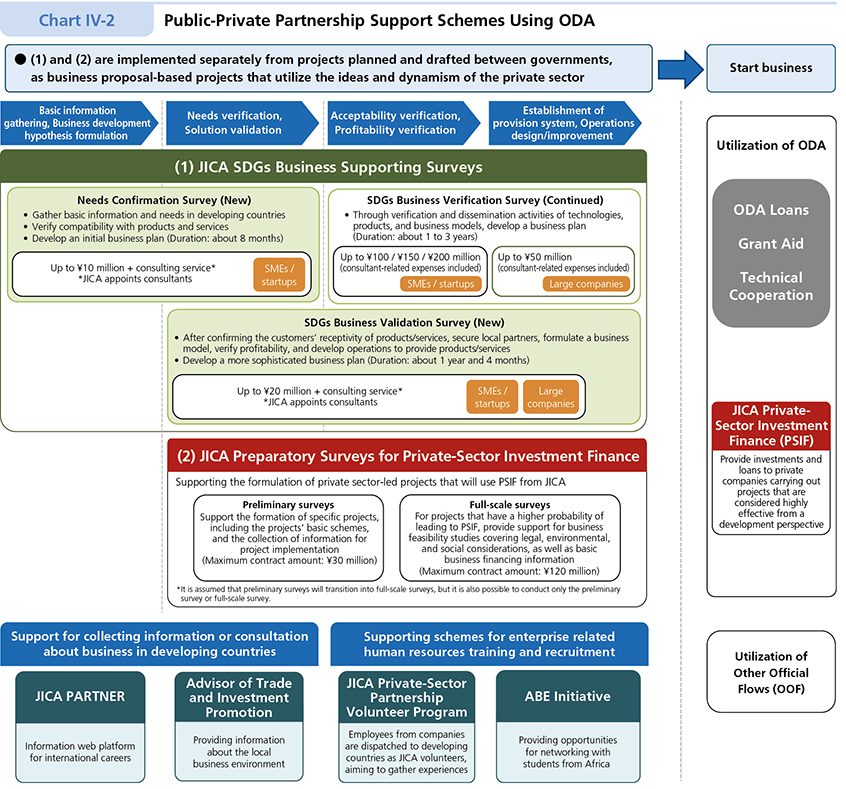
Tanzania, Kenya, Côte d’Ivoire, Ghana, and NigeriaPublic nomination
Supporting the Overseas Business Expansion of Japanese Companies into Africa
Data Collection Survey on Promotion of Agricultural Mechanization through Introduction of Modernized Agricultural Technologies in Sub-Saharan Africa
JICA Data Collection Survey (February 2022 – February 2024)
With a large share of the workforce engaged in it, agriculture in African countries is one of the most important sectors for economic growth and poverty reduction. Many farmers in African countries, however, still use traditional methods in agriculture, so it is a huge challenge to improve their agricultural productivity, including mechanization, as well as the quality of their agricultural products.
“Promoting installation of Advanced Agricultural Technologies” was listed as one of the priority actions under the Agriculture Innovation Platform in Africa (AIPA) Note 1 proposed at the Seventh Tokyo International Conference on African Development (TICAD 7) Note 2 in August 2019.
As a response, it was agreed to set up the Africa Field Innovation Center for Agricultural Technology (AFICAT) Note 3 with the aim of contributing to improving agricultural productivity and the quality of agricultural products. For the launch of a full-scale AFICAT in the future, this JICA data collection survey is run as a pilot activity in the five countries where Japanese companies are interested in expanding their businesses; Tanzania, Kenya, Côte d’Ivoire, Ghana, and Nigeria, focusing on mainly the utilization of rice-related agricultural machinery.
In Nigeria, Honda Motor Co., Ltd. held a seminar for government officials and smallholder farmers in Lafia, Nasarawa State, and demonstrated how to use and maintain a small power tiller with an actual machine. Participating farmers commented, “This will help reduce working hours,” and expectations for the advancement of agricultural mechanization increased.
The necessary implementation structure for the full-scale operation of AFICAT will be proposed based on the knowledge obtained through this survey. AFICAT is expected to continue serving as a foothold for Japanese agriculture-related companies to expand their businesses into Africa. At the same time, it is also counted on to promote agricultural mechanization, enhance agricultural productivity, and improve the quality of agricultural products in African countries, utilizing Japanese products and technologies.
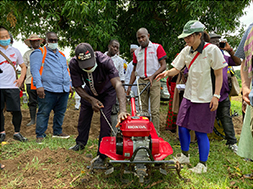
A demonstration of a power tiller conducted by Honda Motor Co., Ltd. for local farmers and officials from the Federal Ministry of Agriculture and Rural Development of Nigeria (Photo: Kaihatsu Management Consulting, Inc.)
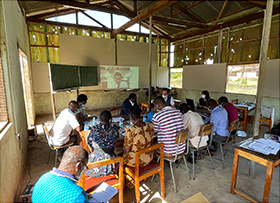
An online seminar in Tanzania for officials from the Tanzanian Ministry of Agriculture held by Kett Electric Laboratory Co., Ltd. Participants lively exchanged questions and opinions about the company’s agricultural machinery and products. (Photo: Kaihatsu Management Consulting, Inc.)
Note 1: A concept that aims to strengthen and promote linkage among the three pillars of the agricultural sector, namely, productivity improvement, farmer empowerment, and high-value addition.
Note 2: See “ODA Topics” regarding TICAD.
Note 3: A framework established to introduce advanced agricultural technology and promote agricultural mechanization in African countries through public-private partnerships between Japan and Africa. It is expected to serve as a base for exhibitions and demonstrations of agricultural materials and equipment, as well as human resources development and innovation.
Glossary
- SDGs Business Supporting Surveys
- The program, which is based on proposals from private companies, assists in matching the needs of developing countries with the advanced products and technologies, etc., possessed by Japanese private companies, and supports the development of businesses that contribute to solving problems in these countries. The public announcements in FY2022 invited proposals for the newly established categories of “Needs Confirmation Survey” and “SDGs Business Validation Survey,” in addition to the existing “SDGs Business Verification Survey with the Private Sector.” In the newly established categories, JICA appoints consultants who can assist Japanese private companies in their business development, and thereby creates an environment in which the companies can concentrate on surveys for business development. The program is expected to not only support the expansion of Japanese small and medium-sized enterprises’ (SMEs’) businesses abroad, but also invigorate the Japanese economy and local communities (see also Chart IV-2).
- Inclusive business
- Inclusive business is a generic term for business models advocated by the UN and the World Bank Group as an effective way to achieve inclusive market growth and development. It includes sustainable Base of the Economic Pyramid (BOP) businesses that resolve social challenges.
- Note 1: The Equity Back Finance (EBF) loan provides a yen loan for the developing country’s share of the investment of the Special Purpose Company (SPC) that takes the lead in public projects in the developing country. It is restricted to PPP infrastructure projects, wherein the recipient country governments or their state-owned companies and others make the investment, and the Japanese companies participate as a business operating body.
- Note 2: The Viability Gap Funding (VGF) loan is a yen loan for VGF that the developing country provides to the SPC in order to secure profitability expected by SPC when Japanese companies invest in the PPP infrastructure projects by the developing country in principle.
- Note 3: Announced in 2015, the Partnership for Quality Infrastructure has the following pillars: expansion and acceleration of assistance through the full mobilization of Japan’s economic cooperation tools, collaboration between Japan and ADB, expansion of the supply of funding for projects with relatively high risk profiles by such means as enhancement of the function of JBIC, and promoting “Quality Infrastructure Investment” as an international standard.
- Note 4: Yen loans with Preferential Terms for High Specification are concessional yen loans provided to projects recognized as contributing to the promotion of “Quality Infrastructure” based on the “G7 Ise-Shima Principles for Promoting Quality Infrastructure Investment” compiled at the G7 Ise-Shima Summit in 2016.
- Note 5: Announced at the G7 Ise-Shima Summit held in 2016, the Expanded Partnerships for Quality Infrastructure includes Japan’s commitment to provide approximately 200 billion US dollars in funds in the following five years for infrastructure projects in the world including Asia. It also includes further system reforms, strengthening the structure of related institutions including JICA, as well as securing financial foundations.
- Note 6: https://www.jica.go.jp/priv_partner/activities/sme/index.html (in Japanese only)
- Note 7: https://www.jica.go.jp/priv_partner/activities/psiffs/index.html (in Japanese only)
- Note 8: PSIF assists in the following fields for funding: (i) infrastructure development and accelerating growth, (ii) SDGs and poverty reduction, and (iii) measures against climate change.
- Note 9: https://www.jica.go.jp/activities/schemes/finance_co/loan/index.html (in Japanese only)
